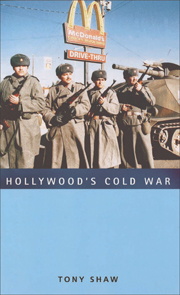Book contents
- Frontmatter
- Contents
- Acknowledgements
- List of Abbreviations
- Introduction
- 1 Love and defection
- 2 The enemy within
- 3 Projecting a prophet for profit
- 4 Of gods and moguls
- 5 Negotiable dissent
- 6 Turning a negative into a positive
- 7 A cowboy in combats
- 8 Secrets and lies
- 9 The empire strikes back
- Conclusion
- Bibliography
- Film Index
- General Index
Conclusion
Published online by Cambridge University Press: 05 August 2013
- Frontmatter
- Contents
- Acknowledgements
- List of Abbreviations
- Introduction
- 1 Love and defection
- 2 The enemy within
- 3 Projecting a prophet for profit
- 4 Of gods and moguls
- 5 Negotiable dissent
- 6 Turning a negative into a positive
- 7 A cowboy in combats
- 8 Secrets and lies
- 9 The empire strikes back
- Conclusion
- Bibliography
- Film Index
- General Index
Summary
I won't be so bold as to say that American movies are responsible for the popular uprising in China. But I am willing to bet that for more than a few Chinese citizens our films served as an inspiration to strike for something better.
Richard Frank, President of Walt Disney Studios, to the US Congress, July 1989Female Soviet apparatchiks spellbound by Parisian lingerie. Emotionally deranged subversives betraying their wholesome American families for the communist cause. Giant alien robots espousing nuclear disarmament. Revamped Old Testament stories of freedom versus dictatorship. Brave black Americans campaigning for racial progress. GIs forced to play Russian roulette for the entertainment of their Viet Cong captors. Globe-trotting Western spies slaying KGB assassins with a hi-tech gizmo in one hand and a curvaceous blonde in another. Kafkaesque CIA agents murdering their colleagues for oil. Muscle-bound Russian cops beating America's new drug-dealing enemies to a pulp.
Hollywood made hay with the Cold War, plundering the conflict for profit and propaganda from beginning to end. Cold War themes appeared in a multitude of genres including musicals, Westerns, biblical epics, romantic comedies, science-fiction fantasies, documentaries, detective thrillers and absurdist biopics. The result was thousands of images — some bland, some compelling — that helped millions of people worldwide to grasp the ‘real’ meaning of a conflict that for most of them was peculiarly abstract and, for many Americans especially, was fought solely on an imaginary level.
- Type
- Chapter
- Information
- Hollywood's Cold War , pp. 301 - 309Publisher: Edinburgh University PressPrint publication year: 2007



